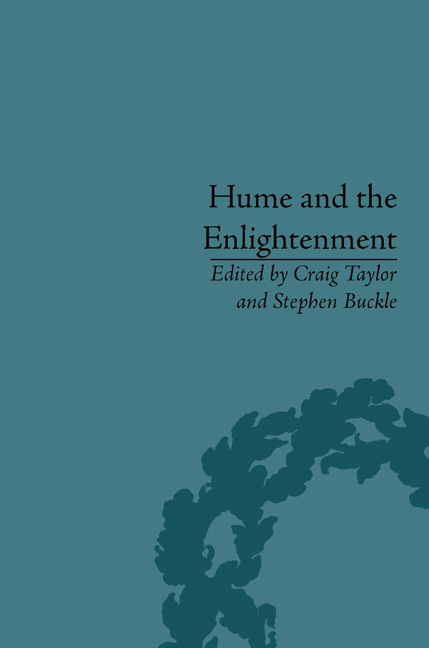Book contents
- Frontmatter
- CONTENTS
- Acknowledgements
- List of Contributors
- Abbreviations
- Introduction: Hume and his Intellectual Legacy
- 1 Hume and the Enlightenment
- 2 Will the Real Enlightenment Historian Please Stand Up? Catharine Macaulay versus David Hume
- 3 Philosophy, Historiography and the Enlightenment: A Response to Green
- 4 Hume's Enlightenment Aesthetics and Philosophy of Mathematics
- 5 Part 9 of Hume's Dialogues and ‘The Accurate Philosophical Turn of Cleanthes
- 6 ‘Strange Lengths’: Hume and Satire in the Dialogues Concerning Natural Religion
- 7 A Modern Malignant Demon? Hume's Scepticism with regard to Reason (Partly) Vindicated
- 8 Hume on Sympathy and Cruelty
- 9 Hume's Natural History of Justice
- 10 Hume and Rawls on the Stability of a Society's System of Justice
- 11 Can Hume's Impressions of Reflection Represent?
- 12 Mechanism and Thought Formation: Hume's Emancipatory Scepticism
- Notes
- Works Cited
- Index
5 - Part 9 of Hume's Dialogues and ‘The Accurate Philosophical Turn of Cleanthes
- Frontmatter
- CONTENTS
- Acknowledgements
- List of Contributors
- Abbreviations
- Introduction: Hume and his Intellectual Legacy
- 1 Hume and the Enlightenment
- 2 Will the Real Enlightenment Historian Please Stand Up? Catharine Macaulay versus David Hume
- 3 Philosophy, Historiography and the Enlightenment: A Response to Green
- 4 Hume's Enlightenment Aesthetics and Philosophy of Mathematics
- 5 Part 9 of Hume's Dialogues and ‘The Accurate Philosophical Turn of Cleanthes
- 6 ‘Strange Lengths’: Hume and Satire in the Dialogues Concerning Natural Religion
- 7 A Modern Malignant Demon? Hume's Scepticism with regard to Reason (Partly) Vindicated
- 8 Hume on Sympathy and Cruelty
- 9 Hume's Natural History of Justice
- 10 Hume and Rawls on the Stability of a Society's System of Justice
- 11 Can Hume's Impressions of Reflection Represent?
- 12 Mechanism and Thought Formation: Hume's Emancipatory Scepticism
- Notes
- Works Cited
- Index
Summary
In the Dialogues concerning Natural Religion, particularly in the early Parts of this work, Hume, through Philo (and to some extent through Demea), urges against attempting to gain insight into the divine nature. For example, in Part 1, Philo tells Cleanthes:
[W]hen we look beyond human affairs and the properties of the surrounding bodies: When we carry our speculations into the two eternities, before and after the present state of things; into the creation and formation of the universe; the existence and properties of spirits; the powers and operations of one universal spirit, existing without beginning and without end; omnipotent, omniscient, immutable, infinite, and incomprehensible: We must be far removed from the smallest tendency to scepticism not to be apprehensive, that we have here got quite beyond the reach of our faculties… We are like foreigners in a strange country, to whom everything must seem suspicious, and who are in danger every moment of transgressing against the laws and customs of the people, with whom they live and converse. (D 1.10.11)
Philo cautions Cleanthes that wherever our arguments run wide of common life, that the most refined scepticism comes to be on a footing with them, and is able to oppose and counterbalance them. The mind must remain in suspense between them, and Philo concludes, ‘it is that very suspense and balance, which is the triumph of scepticism’ (D 1.11.12).
- Type
- Chapter
- Information
- Hume and the Enlightenment , pp. 77 - 90Publisher: Pickering & ChattoFirst published in: 2014

